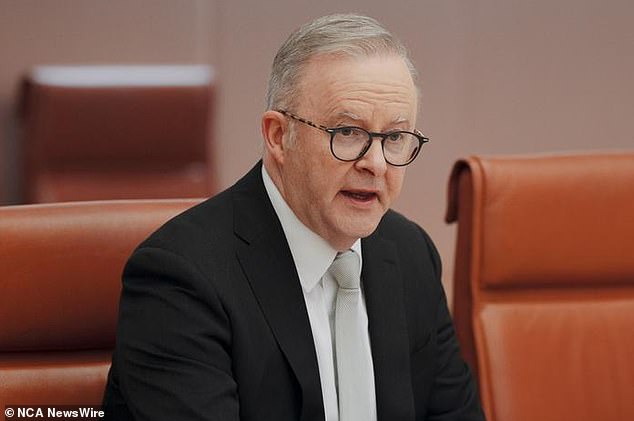Anthony Albanese shut down a reporter, saying he was prioritising questions from women as he unveiled a new multi-million pound package to support frontline services tackling family violence.
Speaking to the media alongside state and territory leaders following a National Cabinet meeting on Friday, the Prime Minister announced a $4.7 billion package to bolster frontline services for people fleeing family violence.
Answering questions about the plan, Mr Albanese pointed to a group of journalists but stopped one as he began his question.
“I’m deliberately talking about women rather than men,” he said, handing the floor over to another journalist.
Under the plan, the federal government will provide $3.9 billion, with states and territories picking up the rest.
Some $800 million will be allocated specifically to strengthening legal aid services, with priority given to responding to gender-based violence.
“We know that a coordinated approach at national level is required to address this national crisis,” the Prime Minister said.
“We must act to ensure the safety of women. These horrific and disturbing deaths and this appalling violence must be prevented.”
The National Cabinet has agreed a $4.7 billion package to take a “nationally coordinated approach” to combat family violence. Photo: NewsWire / David Beach
Friday’s announcement comes amid urgent calls for more support from critical frontline services.
New analysis by Homelessness Australia has revealed that domestic violence victims’ access to homeless support services has worsened over the past five years.
In fiscal year 2022-23, nearly one in four people (23.1 percent) who needed short-term or emergency housing had not received services.
In 2017-18 that figure was 20.8 percent.
The figures were bleaker for people seeking long-term housing, with 71.1 per cent unable to access services, another rise from 65.3 per cent recorded in 2017-18.
Legal Aid, which provides more than 32,000 family law grants and more than 14,000 domestic violence legal aid services annually, has painted a similarly bleak picture, saying it has had to turn people away because of capacity limitations.
National Children’s Commissioner Anne Hollonds said tough-on-crime rhetoric was counterintuitive as it only increased the chances of reoffending.
“We are putting politics ahead of prevention,” he told AAP.
“It sounds good because it seems tough on crime, but it’s not evidence-based and it won’t keep the community safer.”
Ms Hollonds said this was because locked-up children had high rates of reoffending and learned more about criminal behaviour while behind bars.
Increasing prison sentences to deter crime was not effective because 11- or 12-year-olds did not make calculations before committing a crime, he said.
“Children don’t make the decision to steal food or a car based on the length of their sentence: it’s an absurd idea.”
Governments must recognise that when children commit crimes their basic needs are not met, whether it is housing, family care or mental health, the commissioner said.
Restrictions on alcohol sales, delivery times and advertising, as well as tighter regulation, have been called for to address the role alcohol plays in domestic and sexual violence.


